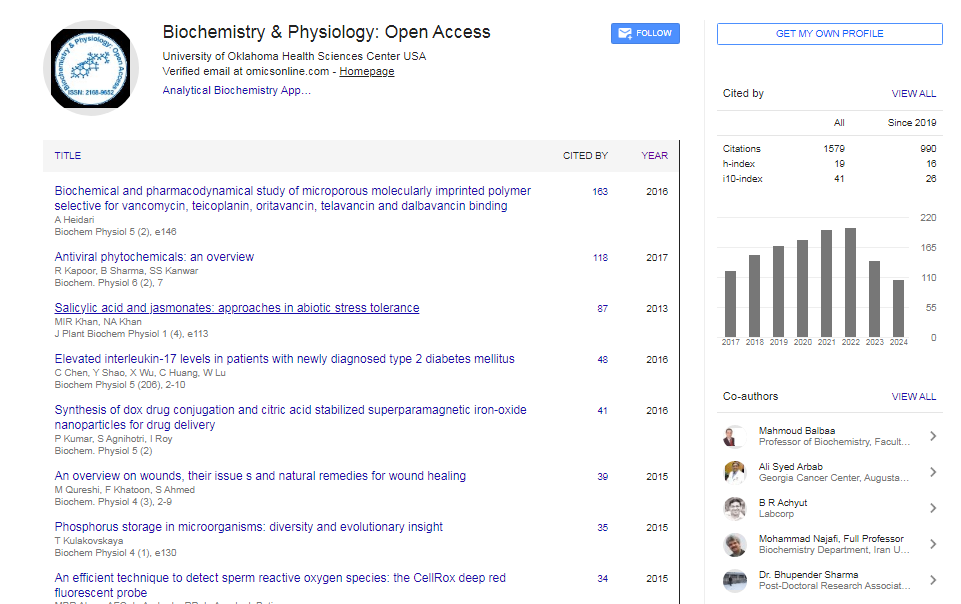Our Group organises 3000+ Global Conferenceseries Events every year across USA, Europe & Asia with support from 1000 more scientific Societies and Publishes 700+ Open Access Journals which contains over 50000 eminent personalities, reputed scientists as editorial board members.
Open Access Journals gaining more Readers and Citations
700 Journals and 15,000,000 Readers Each Journal is getting 25,000+ Readers
Google Scholar citation report
Citations : 1579
Biochemistry & Physiology: Open Access received 1579 citations as per Google Scholar report
Indexed In
- CAS Source Index (CASSI)
- Index Copernicus
- Google Scholar
- Sherpa Romeo
- Open J Gate
- Genamics JournalSeek
- Academic Keys
- JournalTOCs
- Ulrich's Periodicals Directory
- Electronic Journals Library
- RefSeek
- Directory of Research Journal Indexing (DRJI)
- Hamdard University
- EBSCO A-Z
- OCLC- WorldCat
- Scholarsteer
- SWB online catalog
- Virtual Library of Biology (vifabio)
- Publons
- Euro Pub
- ICMJE
Useful Links
Recommended Journals
Related Subjects
Share This Page
Divya Patel

Divya Patel
Center for Cancer Research and Therapeutic Development
Clark Atlanta University,
USA
Biography
Ms. Divya Patel received her Master’s in Microbiology and Ph.D. in Biochemistry from The Maharaja Sayajirao University of Baroda, India. She then moved to USA in order to pursue postdoctoral research at Sylvester Comprehensive Cancer Center, University of Miami, Miami, FL where her work focused on generating RNA Aptamers against immunotherapeutically important target molecules belonging to the tumor necrosis factor (TNF) receptor super family. Dr. Patel is currently continuing her postdoctoral training at Clark Atlanta University’s Center for Cancer Research and Therapeutic Development (CCRTD) and her research concentrates on exploring the role of members of bHLH family of transcription factors in prostate cancer development and progression.
Research Interest
His research focusses on human medicine with the goal of identifying key disease (specifically cancer) mechanisms and targets. With this aim, his current research work concentrates on exploring the role of members of bHLH family of transcription factors, specifically E2A (TCF3) in prostate cancer development and progression. E2A is known to regulate transcription of target genes by homo- or heterodimerization with other bHLH proteins such as MyoD, Mash, NeuroD and Id family of helix loop helix proteins. In general, E2A promotes cell differentiation, acts as a negative regulator of cell proliferation in normal cells and cancer cell lines and is required for normal B-cell development. Given the diverse biological pathways regulated/ influenced by E2A little is known about its expression in prostate cancer. My project therefore involves trying to investigate the mechanism of regulation of E2A in prostate cancer which could either be epigenetic or by gene fusion and chromosomal translocations or androgen receptor dependent. I was also involved in generating RNA Aptamers against immunotherapeutically important target molecules belonging to the tumor necrosis factor (TNF) receptor super family such as OX40 (CD134, TNFRSF4) and 4-1BB (CD137, TNFRSF9). Aptamers are single stranded oligonucleotides capable of binding to their target molecules with high affinity and specificity. They are derived by a process called SELEX (Systematic Evolution of Ligands by EXponential enrichment). Unlike monoclonal antibodies, aptamers have low molecular weights, are chemically synthesized and non immunogenic. Thus, aptamers can serve as promising probes for molecular recognition for diagnostic and therapeutic purposes.

 Spanish
Spanish  Chinese
Chinese  Russian
Russian  German
German  French
French  Japanese
Japanese  Portuguese
Portuguese  Hindi
Hindi 
